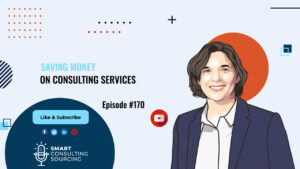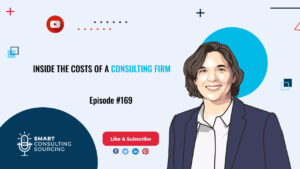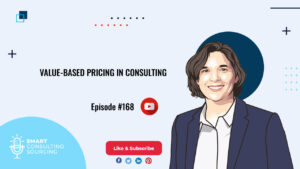Hello and welcome back to Smart Consulting Sourcing, the only podcast about consulting procurement.
I am Hélène, and today we will be talking about Supplier Relationship Management . However, before that, let me give a recap of last week’s podcast.
Management consultancies are still grappling with how to deal with digital technologies and emerging business models. The trend for consultancies in 2022 will be to build comprehensive digital strategies and remodel existing business and operational models in a way that keeps the C-level connected to stakeholders.
A number of industries have been compelled to adopt new ways of working as a result of the pandemic. Even the consulting industry, which is predominantly client-driven, has had to adjust to new service, structure, technology, and operation methods.
Listen to the complete podcast about Consulting Industry in 2022.
However, this week, I want to discuss about Supplier Relationship Management.
Supplier Relationship Management (SRM), like any other area, is a huge topic for consulting services. The manner Procurement manages Consulting Providers should be consistent with the Company’s overall SRM policies.
Suppliers represent the beginning of the supply chain in any industry, and hence have a significant impact on following business activities.
They not only offer you the items and services you need to run your business, but they are also valuable sources of information, guidance, and, most critically, trade credit – something that the average small business relies on to survive.
In order to get the best out of your suppliers, you must maintain a good relationship with them.
How do you manage the relationship with your supplier?
The close relationship that exists between a consulting firm and its clients might greatly accelerate and simplify projects.
When you deal with a consultant on a regular basis, he becomes “plug-and-play”: he understands your company and your industry. Regularly meet with your Strategic and Preferred Suppliers to keep them informed and explain the findings of their Performance Assessments.
Talking about a strategic approach, it is a must when it comes to SRM.
You’ll be able to unearth the hidden value in your supply base with good supplier relationship management. You can’t have a connection with every supplier; for many, you only need them to deliver what you need on schedule, in full, and within the agreed-upon budget or price range.
Others may require some type of involvement to keep things on course, while a small number of other suppliers may be able to achieve significantly better value; value that can, in some situations, create a dramatic and game-changing impact on your business.
First, you have to segment your suppliers
To find your ideal suppliers, you should start with segmenting them all. When it comes to supplier segmentation for consulting services, you need to follow the same criteria that you have been using for other categories.
But you have to be careful here. I know that many of you have objectives to reduce the number of suppliers in an effort to control the tail and reduce complexity. And consolidating the number of suppliers is indeed an efficient lever to control your spend.
But this is a lever that you have to use with caution. Let’s imagine that a company has decided to keep only 3-4 suppliers per capability in the consulting category. So the procurement team will first define the taxonomy and then qualify the right number of suppliers per capability.
If your capabilities are too wide, you are de facto excluding boutique consulting firms from the list. Why? Because they rarely cover an entire capability.
Let’s look at Strategy for instance. It includes Corporate Strategy, Business Unit Strategy, Organization Architecture, Management Model, Corporate Governance, Innovation Strategy, M&A, Strategic Communication as well as Economic or Government Policy.
Besides some consulting firms are better at high-level strategy and others at strategy execution.The only candidates that cover the whole category are the top 10 consulting firms. And they come with a premium that can be up to 40% more than a boutique firm.
So you might end up with higher costs on average that will definitely kill the purpose of the initiative.
So what you rather need is a more granular taxonomy, based on your needs for the next 3 to 5 years, and then qualify both one-stop-shops and boutique firms.
Right, so now is the time to identify the right strategic supplier
Since the large firms account for the major share of an organizations’ consulting spending, organizations typically designate the largest Consulting Firms as their strategic suppliers. However, spending should not be the primary criteria for identifying strategic suppliers.
This is just one of the criteria. If we return to the demand management criteria we discussed in a previous podcast, a strategic provider could have a one-of-a-kind strategic skill, or it could be a supplier with a broad range of strategic capabilities, working on strategic projects, or projects that have a big impact on the business.
Supplier relationship Management should encourage continuous improvement.
You must initiate an improvement plan when a problem is discovered during a project with a Strategic or Preferred Supplier, which is frequently documented through the Performance Assessment. Give the supplier the opportunity to provide you with input on the scoping and management of a Consulting Project.
But if you have to share with your suppliers their performance how would you know if the project they are working on is actually advancing your goal? Well, now comes the part of Supplier Performance Management or Performance Analysis.
Only a small percentage of companies track the performance of their consulting partners. Mostly because consulting is an intangible service, and they don’t know how to evaluate a project’s content. We’ll go over how to set up a Performance Measurement System in more depth in a later podcast, but here’s a preview peek.
The system should be based on the factors that contribute to the success of a consulting project. Quality of delivery will be at the forefront of your attention, along with time/quality/cost considerations.
The impact of the Consulting team on the business may always be measured based on the satisfaction of the sponsor and project leader with the results, even if it is not quantified in numbers.
The team’s talent and expertise, as well as the soft features, all contribute to the project’s success (ability to build trust or transfer knowledge, for instance).
Depending on the level of precision you require, the granularity of the measurement can vary. If you want to be able to evaluate and compare the data, however, you should be as thorough as possible.
Quick Note: At the conclusion of the project, performance is evaluated. Nothing, however, prevents a mid-project review. The easiest way to prevent lengthy and difficult conversations at the end is to ensure that the project is moving according to plan and to implement any necessary corrective actions and revisions to the mandate (if the situation has changed).
In the end, after spending a significant amount of time working on projects with you, consulting firms begin to develop a strong understanding of your company.
They would be thrilled to work on another project with you (unless you have been a painful client, but that is another story). Inquire about your firm and what your consultants would do if they were in your shoes.
The impact of this simple inquiry will astound you. As a result, you will almost always receive candid feedback regarding your operations in record speed when compared to the status of the industry or the newest thought leadership.
In Conclusion,
To get the best out of the Supplier Relationship Management and to get ahead of the competition small changes are necessary to see major results in the end! A simple yet effective strategic approach to Supplier Management can provide you with desired outcomes!
Things that you must keep in mind are how well you organize your category and layout a plan to overlook the work of your suppliers as a client.
Last but not the least, I would like to invite you to Consulting Quest’s next webinar, which will discuss the nuances of managing a consulting project as a client.
Know what? If you want to achieve top ROI from your consulting project, you must manage it like a consulting pro. Do join me in this session to know about steps and techniques that no PMP can tell you.
Whether you’re looking to hire consultants soon or later, this knowledge will always come in handy in taking control of your consulting project and steering it towards the desired outcome.
The webinar is on the 5th of April 2022 at 5 pm CET, all you guys have to do is go on my Linkedin profile in the Highlight section and register yourself! Hope to see you there.
And that marks the end of our podcast, folks. Next week, I want to talk about Global sourcing for consulting. So, stay tuned.
Till then, stay safe and happy sourcing!
If you have other questions about Supplier Relationship Management, remember you can contact me directly on LinkedIn or by email because I am always game for a chat!
Bye and see you next week! Au revoir!







